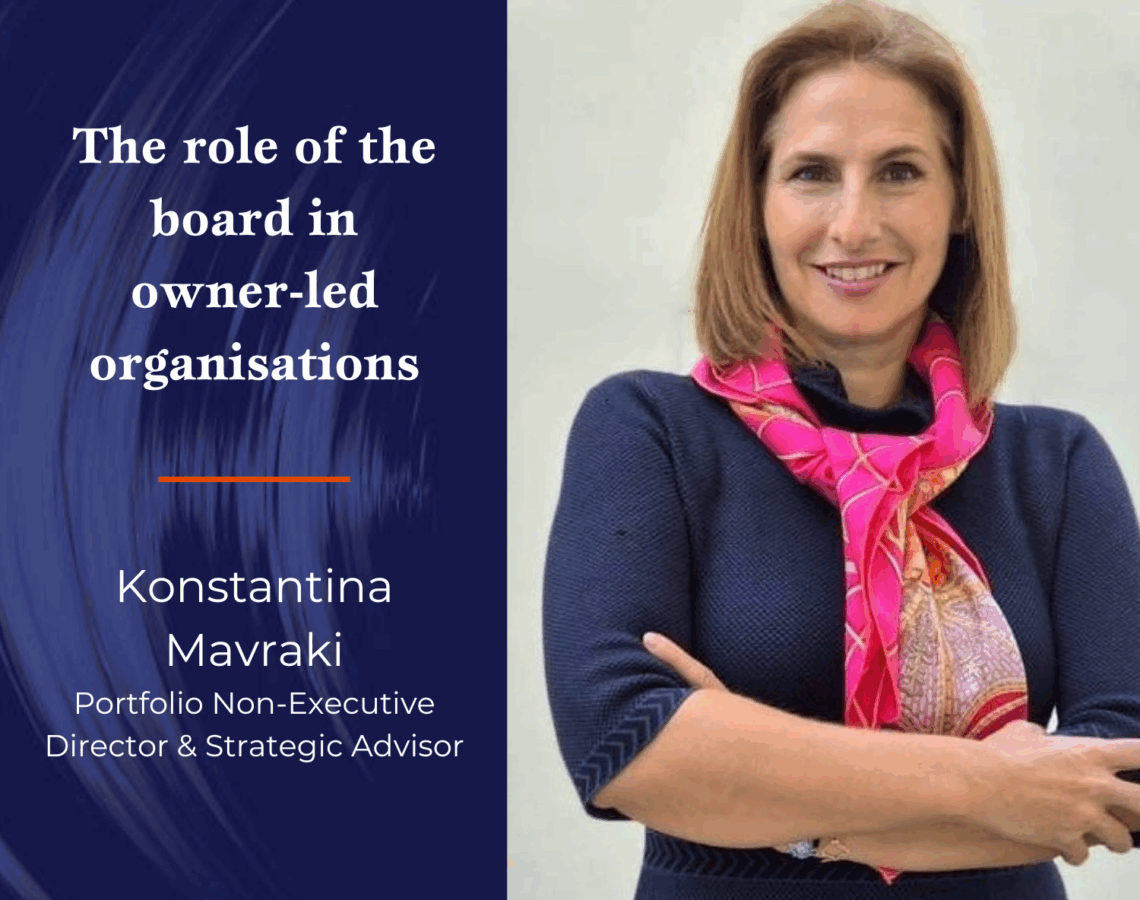The role of the board in owner-led organisations

How do boards add value when the owner is still in the room?
This is the critical question driving our latest Better Boards podcast conversation with Tina Mavraki. A Chartered Portfolio Director with 27 years of experience, Tina has held senior roles at Morgan Stanley, Citi, and Noble Group, where she scaled up multi-billion-dollar businesses. Her board portfolio spans FTSE100 candidate Metlen Energy & Metals S.A. and First Bauxite, alongside advisory roles for Starr Insurance, Piraeus Bank, White Oak Global Advisors, the European Bank for Reconstruction & Development, and the Children’s Investment Fund Foundation. She contributes policy insight to the UK FCA on governance, climate transition, executive pay, and corporate culture, with thought leadership featured by the Financial Times and the UK Institute of Directors. Tina draws on this remarkable breadth of experience across industry, investment, and policy to offer a nuanced understanding of what makes governance in founder-led firms so unique—and so vital.
“Invariably, owners invite a board because they’re looking to make a transformation. Something is about to change.”
Boards in owner-led companies are not just formalities—they’re catalysts. Tina underscores that owners typically engage boards during moments of transformation: entering new markets, preparing for capital events, or transitioning beyond family governance structures. The board becomes a lever for unlocking potential.
“They provide the emotional, mental, tactical support in order to make this happen.”
The presence of the founder brings both opportunity and complexity. Boards provide perspective, offering seasoned leadership and targeted expertise to help realize the founder’s vision. Yet it’s not just about knowledge—it’s about emotional support, tactical insight, and relational intelligence.
“Boundaries is the most beautiful growth tension you can get in owner-led organizations.”
The proximity to the founder reshapes board dynamics. Tina identifies two dominant themes: helping founders expand their boundaries while honoring them, and supporting credible succession planning. It’s a delicate dance—balancing strategic evolution with personal legacy.
“You have to earn that trust… You show up, understand the organization, and tailor your interventions.”
In organizations where relationships are highly personal, trust must be earned. Tina stresses the importance of “walking the floor,” understanding operations intimately, and aligning interventions with the founder’s worldview. Only then can directors tailor their guidance effectively.
“You have to earn that trust… You show up, understand the organization, and tailor your interventions.
Serving on these boards is not a passive role. Directors must commit the time to understand personalities, business mechanics, and subtle power dynamics. Only through that investment can they drive meaningful impact.
“They are not there to see through the effects of that advice.”
Advisory boards can provide expertise in areas like technology or sustainability without the obligations of fiduciary duty. But as Tina notes, their insights may not always translate into practical or timely actions.
In summary: Working with owner-led companies requires an appreciation of their unique DNA. It’s about translating credibility into trust, and vision into executable strategy. As Tina reminds us, when done right, board service in these firms can be the most impactful role a director can play.
The three top takeaways for effective boards from our conversation are:
- Take time to deeply understand the operating environment, priorities, and personalities.
- Lean into the board process—impact is immediate and critical in founder-led firms.
- Structure interventions with insight, sensitivity, and strategic alignment.
Remember to subscribe and never miss an episode of the Better Boards Podcast Series. It’s available on Apple, Spotify, or Google.
To find out how you can participate in the Better Boards Podcast Series or for more information on Better Boards’ solutions, please email us at info@better-boards.com.




